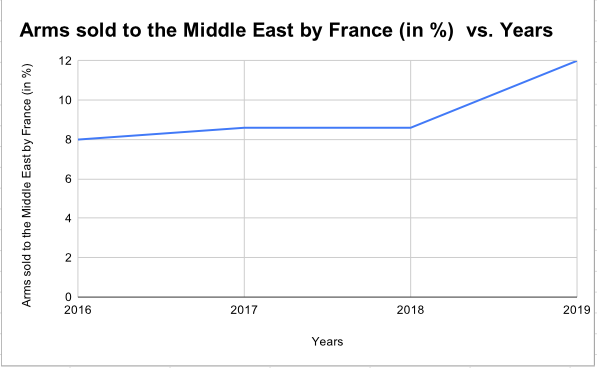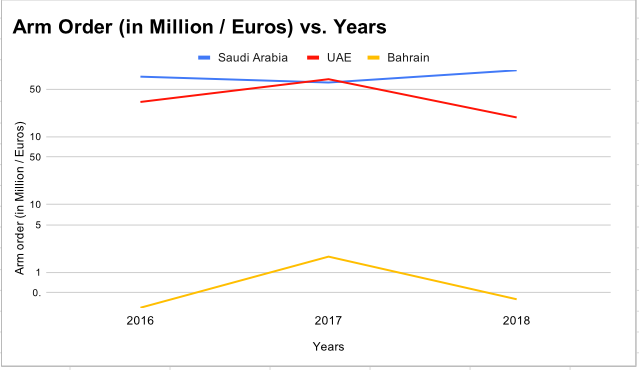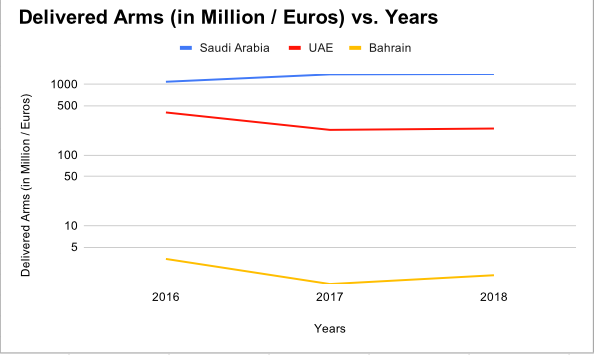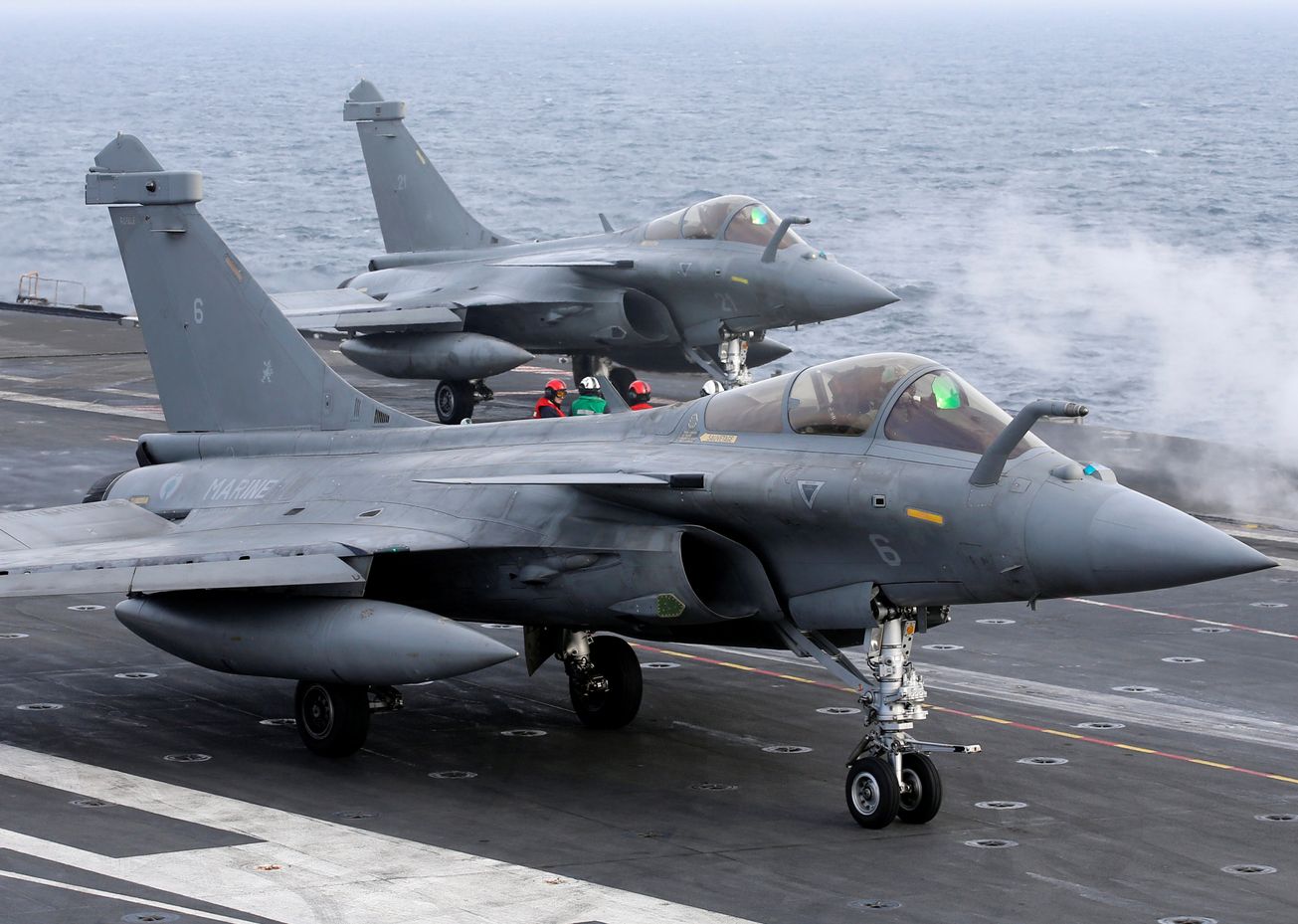France plays a leading role in global arms exports. According to the Stockholm International Peace Research Institute (SIPRI), from before the Arab Spring protests in 2011 up until today, France has been in the top-5 of global arms exporters. In 2017, France took over China’s place as the third-largest arms exporter. The latest SIPRI report on Trends in International Arms Transfers shows that amongst the other top-5 countries—US, Russia, China, and Germany—France has experienced the highest growth rate in arms exports, increasing its arms sales by 72% between 2015 and 2019 compared to the previous period 2010 – 2014.
The arms trade has become the most lucrative export for France since the 1960s when the country has embraced the doctrine that arms sales are essential for the country’s strategic autonomy. Moreover, being a major arms supplier, France possesses a significant diplomatic presence, strategic trade partners, and influence over global regions which ensures stability and combats terrorism in order to maintain the French national security. On 7 May 2019, during the hearing of the Minister of Armed Forces in the National Assembly, it was disclosed that the current government is also reluctant to change its liberal arms export policy, which comes at a human cost and violates the UN Arms Trade Treaty, to which France acceded in 2014. As reported by the Minister of Defence Florence Parly, the arms trade ensures the sovereignty of the country, and it is intrinsic for France to maintain the independence of its defence industry.
However, as the French defence industry cannot survive only from domestic orders, the promotion of arms’ export had to reach a global scale. According to leaked emails, as of 2016, government officials were seeking to establish a political framework and adapt it to international standards in order to continue their exports. The latest Parliamentary report on arms exports in 2018 exposes these efforts by outlining the advantages of the arms trade, highlighting that many French citizens are employed in the sector and that the country could gain a 50% higher profit with arms exports than with any other export. The report further assures that France adheres to the UN embargo on arms exports to Iran, Iraq, Yemen, and Libya, and underlines its commitment not only under the UN Arms Trade Treaty but also to the EU Common Position 2008/944/CFSP which specifies not to export arms to countries that commit human rights violations.
Despite these guarantees, France continues to provide export licenses to defence firms that sell weapons to Saudi Arabia, the United Arab Emirates (UAE), and Bahrain. Even when the “Commission interministérielle pour l’étude des exportations de matériels de guerre” (CIEEMG)—comprised of the Ministry of Defence, the Ministry of Foreign Affairs, and the Ministry of Economy—was unable to decide on the authorization of a license due to issues concerning human rights violations, President Emmanuel Macron intervened and made the deal. The Parliamentary report on arms exports in 2019 shows that the French government authorized 583 licenses to Saudi Arabia and 522 to the UAE between 2016 and 2018, dramatically increasing the French arms export to the Middle East over the last four years.
Graphic 1: Arms sold to the Middle East by France (in %) vs. Years

Find the Table of Controversial Arm Sales HERE
Furthermore, according to a classified document from the French Ministry of Defence that was leaked by Disclose, several contradictions in the stated sales are evident. The document, written by France’s military intelligence, states that French-made weapons are being used in the ongoing war in Yemen and are therefore implicated in the commitment of war crimes. The French government, as well as President Macron, is aware of the crimes described in the report. French firms which produce arms, such as the wholly state-owned Nexter, have manufactured armoured vehicles that have been sold to Saudi Arabia, and the leaked report reveals that CAESAR guns are being used to pave the way for Saudi troops to enter Yemen. More specifically, 132 CAESAR howitzers have been delivered to Saudi Arabia since 2010, and further orders have been placed. The leaked document shows that 48 of those vehicles are allegedly positioned near the Yemeni border. According to Disclose, the population that lives within the target of the artillery fire consists of 436,370 civilians.
In a period of almost three years between early 2016 and late 2019, 35 civilians lost their lives due to bombing attacks within range of the stationed CAESARs. This is in clear contradiction with the statement of Minister Parly, who claimed that to her knowledge, no equipment was sold to Saudi Arabia for purposes other than defence. Therefore, her other proclamation that the humanitarian situation in Yemen worries her must be questioned. In her role as the Minister of Defence, she must have been aware of the fact that French-made weapons are responsible for the death of dozens of civilians in the war in Yemen. As a result, France is in clear breach of not only its obligations under the UN Arms Trade Treaty and the EU Common Position 2008/944/CFSP but also of fundamental French values and its long tradition of humanitarianism.
Not only were French-made weapons sold to Saudi Arabia, but the UAE is also a major importer of French arms. From 2015 to 2019, France was the UAE’s second-largest arms exporter. It is therefore not surprising that Disclose’s leaked report also mentions the sale of arms to the UAE army—primarily Leclerc-type tanks—that are also being used in the war in Yemen. The report reveals the location of these tanks and, despite the Defence Minister’s statement, the map in the leaked document shows that they are being used in combat. Not only are these tanks manufactured by arms companies in France, but the report also proves that they only work with French long-rod penetrator ammunition. In November 2018, 55 civilians became victims of the artillery fired by these tanks.
As Disclose proves in its report, not only the Minister of Defence but also the French Foreign Affairs Minister Jean-Yves Le Drian made false statements about arms sales in connection with the war in Yemen. Although Minister Le Drian was aware of the details set out in the leaked report, he wrongly claimed during a Foreign Affairs commission meeting in February 2019 that “Saudi Arabia’s action is mainly by air and we don’t provide anything to the Saudi Air Force,” despite knowing that air raid attacks in the war in Yemen targeted mostly civilians. Minister Le Drian’s false assertion is evidenced in Disclose’s report, which shows that only a few months earlier, the French defence group Thales had provided Saudi Arabia’s air forces with technology that enabled pilots to direct their missiles precisely to a specific target by laser.
Moreover, also the armed forces in the UAE use arms manufactured in France. This includes weapons used in the UAE’s attack on the Yemeni opposition with French-built multi-role Mirage 2000-9 fighter planes. Although the leaked report does not mention the type of missiles which are used in UAE’s airstrikes, Black Shaheen and AASM missiles co-developed by the UK and France but produced by the French company Safran can be used in the Mirage 2000-9 fighter planes. Furthermore, French-made A330 MRTT refuelling tanker aircraft sold to both Saudi Arabia and the UAE play a key role in the armed conflict in Yemen.
Graphic 2: Arm Order (in Million / Euros) vs. Years

Graphic 3: Delivered Arms (in Million / Euros) vs. Years

The statement from Minister Parly at the National Assembly claims that humanitarian aids to civilians in Yemen are of priority. However, the leaked report proves that two warships manufactured in France “take part in the naval blockade” and are therefore responsible for the starvation of millions of Yemenis. For France, the export of arms to Gulf countries is necessary to keep French arms companies profitable. The selection of trade partners is based on a purely financial criterion. While France has ratified the UN Arms Trade Treaty aimed at regulating the arms market and preventing countries from committing crimes against its populations, its international responsibility to guarantee global peace and security is contradicted by its arms exports to Gulf countries. France is therefore in full violation of the UN Arms Trade Treaty, to which the Ministry of Defence refuses to attach substantial significance, and the EU Common Position 2008/944/CFSP, which prohibits the transfer of weapons to countries accused of war crimes.
According to a report by the Office of the United Nations High Commissioner for Human Rights, the anti-Houthi coalition led by Saudi Arabia has acted offensively without respect for the principles of distinction, proportionality, and precaution laid down in the Geneva Conventions, at the risk of being accused of war crimes and crimes against humanity. This includes the use of heavy weaponry and indiscriminate firing in urban areas; the bombing of residential areas, markets, weddings, funerals, detention centres, and civilian boats; the failure to comply with the “list prohibiting the bombing of listed sites”; and the practice of “double strikes”, which are recurrent and affect first aid areas. In response, Minister Parly merely explained in 2018 that “the use of weapons, once delivered, is normally controlled, but conflicts can evolve […] Many countries are confronted with this situation: having delivered weapons to other countries when these weapons were not supposed to be used [in Yemen].” France, therefore, does not yet seem ready to renounce the export of these weapons to countries where the principles of freedom, equality, and fraternity are far from being watchwords. While other European countries voted to ban weapon exports to Saudi Arabia due to its violation of human rights and involvement in the war in Yemen, France continues to provide them with arms trade.
Not only is France violating its obligations by supplying arms to human rights-violating countries such as Saudi Arabia and the UAE, but there is also evidence that France has sold weapons and equipment to the Bahraini government which were used against peaceful protestors in the 2011 uprisings. Although an official statement by France in February 2011 stated that exports of law enforcement equipment to Bahrain had been suspended, Bahrain Watch found evidence that sales had resumed by 2014 and, despite the brief suspension, French-made riot control equipment continued to be used regularly after 2011 to combat civil unrest in Bahrain. Notably, grenades manufactured in 2012 in France were also found in Bahrain.
The Parliamentary report on arms exports in 2013 reports that “€250,000 worth toxic chemical and biological and riot control equipment were sold to Bahrain.” According to the Parliamentary report on arms exports in 2012, France exported €16 million of ML4 class AEMGs (missiles, rockets, bombs) and €500,000 of ML5 class AEMGs (radar). “It is problematic to sell arms to dictatorial regimes that are known to repress their demonstrators,” said French MP Pouria Amirshahi, former secretary of the National Assembly’s Foreign Affairs Committee. However, in Paris, it is deemed acceptable to trade arms to Bahrain as there is no specific embargo and each piece of equipment is first sent to the “Interministerial Commission for the Export of War Materials.” Amirshahi further stated that “The kingdom is not at all in the same register as a country like Syria […] we’re talking about policing here, not civil war.” There is hence a clear contradiction in ethics in regard to French arms sales and alleged French national values.
According to the Parliamentary report on arms exports in 2013, selling military material did not constitute a treaty violation as riot equipment is not equal to war equipment. However, the EU’s common list of military equipment classifies tear gas within the category ML7, meaning that it is a “riot control” toxic chemical agent. Several NGOs have denounced the continuation of French arms sales to Saudi Arabia, the UAE, Bahrain, and Egypt. Amnesty International France, ACAT, FIDH, and the Human Rights League consider the French state and several French companies to be participating in the repression of these countries. Americans for Democracy and Human Rights in Bahrain (ADHRB) partners with these NGOs to denounce the corrupt exportation of French arms to the Arab Gulf.
In summary, France benefits from the sale of arms to countries such as Saudi Arabia, the UAE, and Bahrain, all of which are responsible for the violation of human rights and form the Houthi opposition coalition in the war in Yemen. In such conflicts, imported French weapons are indisputably used for offensive purposes, rather than defensive, and are instrumental in the endangerment of civilians. Despite the French government’s claim to be transparent about the distribution of arms-sale licenses as well as its affirmation to beforehand assess “the potential consequences of the goods exported concerning regional peace and security, the internal situation in the end-user country and its practices as regards respect of human rights, [and] the risk of diversion to non-authorized end-users,” it is evident that to France, economic profit and strategic regional power are more important than the protection of civilian lives, as well as its commitments to internationally recognized peace treaties.





